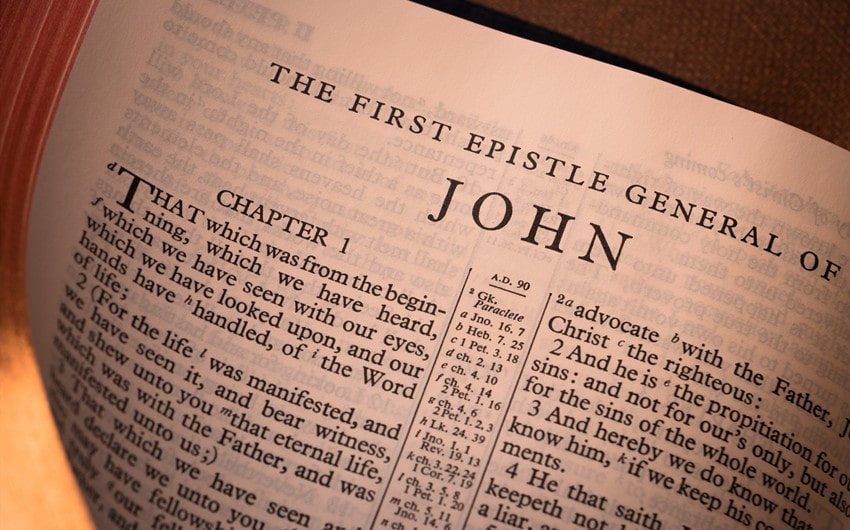What Is the Sin That Leads to Death? A Look at 1 John 5:16
One of the most mysterious and often misunderstood phrases in the New Testament comes from 1 John 5:16. It reads:
“If you see any brother or sister commit a sin that does not lead to death, you should pray and God will give them life. I refer to those whose sin does not lead to death. There is a sin that leads to death. I am not saying that you should pray about that.”
What exactly is this “sin that leads to death”? Why does John, who often speaks of forgiveness and love, suddenly introduce a category of sin that seems beyond help? And why does he seem to discourage prayer in this case?
Let’s explore the meaning of this phrase by looking at the context of the passage, historical interpretations, possible meanings, and how we can respond to it today.
📖 The Context of 1 John
Before we can interpret any verse accurately, we need to understand the letter it’s found in. The book of 1 John is a short epistle written by the Apostle John to a group of early Christians facing confusion, division, and false teaching.
The letter emphasizes some key themes:
- God is light and love (1 John 1:5; 4:8)
- True believers live in obedience and love (1 John 2:3–11)
- Jesus is the Son of God and the source of eternal life (1 John 5:11–13)
In the final chapter, John encourages believers to pray for one another and assures them that God hears their prayers. It’s in this encouraging context that he adds a warning: sometimes, sin can lead to death.
This tells us that John isn’t trying to scare believers—he’s urging discernment. The “sin that leads to death” is not an everyday mistake. It’s something more deliberate, more final, and deeply spiritual in nature.
☠️ Possible Interpretations of “Sin That Leads to Death”
This phrase has led to many interpretations over the centuries. Below are some of the most widely studied and discussed explanations—each with its own scriptural and theological reasoning.
1. A Literal Physical Death as Divine Judgment
Some scholars interpret “death” in this passage as referring to physical—not spiritual—death. In this view, the sin John refers to is one that brings about God’s immediate judgment in the form of physical death.
There are examples of this kind of judgment in the Bible:
- Ananias and Sapphira lied to the Holy Spirit and dropped dead (Acts 5:1–11).
- Some in Corinth who took communion unworthily became sick and died (1 Corinthians 11:30).
In these cases, the sin was not unforgivable in the eternal sense—but it brought serious consequences in this life. John could be warning readers to take sin seriously because some actions bring physical consequences that even prayer may not reverse.
2. The “Unforgivable Sin” – Blasphemy Against the Holy Spirit
Another interpretation connects this verse to Jesus’ words in Matthew 12:31–32:
“And so I tell you, every kind of sin and slander can be forgiven, but blasphemy against the Spirit will not be forgiven.”
Many theologians believe blasphemy against the Holy Spirit refers to the deliberate and final rejection of God’s truth—not just a one-time doubt, but a hardened heart that persistently resists the Spirit’s conviction.
According to this interpretation, John is talking about an ultimate, willful rejection of the gospel. When someone fully rejects Christ and closes themselves off to repentance, they essentially remove themselves from the reach of forgiveness—not because God isn’t willing to forgive, but because they refuse to turn back.
3. Apostasy – Total Rebellion After Knowing the Truth
Another common interpretation is that John is referring to apostasy—the act of someone who once professed faith in Christ completely turning away from Him.
Hebrews 6:4–6 speaks to this idea:
“It is impossible for those who have once been enlightened… if they fall away, to be brought back to repentance.”
In this view, the “sin that leads to death” isn’t a single act, but a long-term, hard-hearted rejection of Christ by someone who once claimed to follow Him. John may have had false teachers in mind—those actively leading others astray while rejecting truth themselves.
🙏 Why Does John Say Not to Pray About It?
This part of the verse can seem especially troubling: “I am not saying you should pray about that.” Is John telling us to give up on certain people?
Most biblical scholars agree: John is not forbidding prayer, but rather acknowledging that some situations are beyond human ability to fix. He may be drawing a line between sins committed in weakness (which we should pray about) and sins committed with full knowledge and willful rebellion.
Ultimately, only God knows the heart. John may simply be urging caution and reminding believers that some choices lead to spiritual separation that prayer alone may not resolve. This doesn’t mean we shouldn’t pray—but that we should also trust God’s judgment and timing.
🧠 What This Means for Us Today
This verse reminds us that not all sin is equal in consequence, even if all sin separates us from God. While Jesus offers complete forgiveness, there is also a need for reverence, repentance, and genuine relationship—not just surface-level belief.
If you’re worried that you’ve committed the “sin that leads to death,” that’s a good sign—you probably haven’t. People who are truly hardened against God don’t typically care whether they’ve crossed a line. The desire to repent and return is a powerful indicator of grace still at work.
As believers, we’re called to:
- Confess our sins and trust in God’s forgiveness (1 John 1:9)
- Pray for one another when we see others struggle (James 5:16)
- Walk in the light and avoid patterns of willful rebellion (1 John 1:7)
And when we see someone far from God, we’re not called to judge their heart—but we can always pray, reach out in love, and leave the outcome to Him.
✝️ Final Thoughts
The “sin that leads to death” is not fully explained in Scripture, and John doesn’t define it precisely. But we do know this: God is just, God is merciful, and He desires that none should perish (2 Peter 3:9).
This verse isn’t meant to stir fear—it’s meant to stir awareness. It’s a reminder to take sin seriously, to cherish the gift of grace, and to never harden our hearts against the truth. For those who walk with humility and a heart willing to repent, there is always a path back to life.
So keep walking in the light. Keep extending grace. And trust that no prayer is wasted when it’s spoken with love and faith in the God who sees what we cannot.






